Hugely Liberating
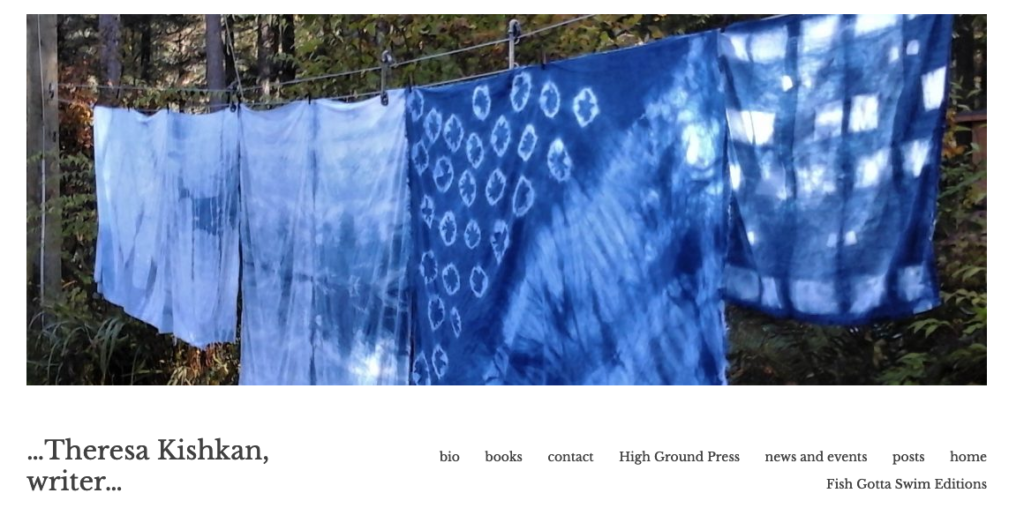
“I began this blog nine and a half years ago. I remember thinking at the time it was such a self-indulgent thing to do but I also remember how much I loved discovering that the things I was thinking about could be written down in a semi-public form and given a place in the (small) world of virtual space. (Of course I know that virtual space is enormous but literary-ish blogs? That reduces the field considerably.) I didn’t need to think of what I was writing as publishable or formal. It was hugely liberating and continues to be….”
Read the rest of Theresa Kishkan’s inspiring reflections on creativity and the blogging form
5 Great Reasons to Take a Blogging Break This Summer

1) Um, because it’s possible you haven’t updated your blog for awhile anyway, so let’s frame that as a good thing. Achievement UNLOCKED. Well done. (I’m not kidding.)
2) Because online traffic always falls off in the summer…almost like the universe is trying to tell you something.
3) Because you’re a human being, not a robot. and taking breaks from work is what human beings do. It’s also how to make blogging sustainable.
4) Because it’s useful and good for your readers to be reminded that you’re not a robot, seeing as humanness is what we all come to blogs for, and also your example might inspire those readers to take their own breaks from the internet too.
5) And finally, because time and distance from your blog will give you space to reflect on your project, to remember why you wanted to do it in the first place, to think about what you might like to do differently (because a blog needs room to grow and space to wander), and to have experiences and see things that you can come home again and actually blog about once your break is over.
Why You Should Be Blogging Like No One is Reading

Blogging stats are important*, and I pay moderate attention to mine, so I was a bit dismayed last summer when my traffic levels plummeted. Part of the problem was that it was summertime, when traffic always falls down a bit, but that didn’t fully explain what had happened. But then these things (particularly online things) are always about ebb and flow, popularity is fleeting, and I’ve found that whenever I get too confident about anything I’m up to, life itself has an amazing ability of administering a kick in the butt–which is always useful, I think, in healthy doses.
So what does a blogger do when her traffic falls off? I, of course, turned to my number one piece of blogging advice, which is Blog like no one is reading. It’s advice that is always useful, and never more so than during those times when no one is, in fact, reading. Blogging like no one is reading runs counter to traditional advice, which is to write for your audience, which is to jump through hoops and concoct elaborate click baity schemes in order to garner online attention, but I find such advice is always delivered by people without a clue of what blogging is all about, with no real sense of the tradition it was born from.
To do the opposite of “blogging like no one is reading” is terrible advice for a variety of reasons. First, because most of the time, no one is going to be reading, and so there has to be something more than feedback from the outside world to push a novice blogger on. Second, because you’re never going to be able to predict what readers will respond to and what they won’t. It’s the strangest serendipity, and attempts to orchestrate this will absolutely drive you crazy. It will also result in online behaviour that just looks ridiculous, and never more so than when it doesn’t work and still, no one is reading. And there you are in your feather boa and your silly top hat, doing a tap-dance, when dancing wasn’t even what you planned to be doing in the first place.
People to come for blogging for a variety of reasons. For many writers, a blog offers a way to keep a website up-to-date and active. An effective blog can be as simple as a news and events page updated monthly or so. Others come to blogging because they were advised to, because it would help their online cachet, though they don’t fully believe in the spirit of the thing. They believe that the blog is to bring forth results (ie traffic, ie book sales, ie fame and fortune) when the fact of the matter is that a blog, at its most bloggish, is its own final product.
So many of us blog for the sake of the blog itself, a work of art, a creation, as eternal as a thing can be in ephemeral world of the internet. The blog is the point, the one thing you have control over anyway, rather than what anyone else happens to do with it.
The thing about blogging like no one is reading is that you really can’t go wrong. And you’ll find that this is precisely what the most amazing and popular bloggers out there have been doing all along anyway–creating something original and personal with their own interests in mind. That reams of followers were interested too was really just happenstance. (There are exceptions to this, but these are so often marketing tools rather than blogs proper. And if you don’t see the distinction between the two, then you and I were never really on the same page in the first place. And you don’t know what a blog is. But I digress…)
The thing about blogging like no one is looking is that it gives you some perspective, allows you to take a real good look at what you’re doing and why you’re doing it, and change and develop accordingly. It is easy to get caught up in a run for readers, but when winning traffic becomes your sole preoccupation, then you’re doing blogging wrong. You’re probably not having fun either.
Anyway, of course, these are all the things you tell yourself during the summer that your blog’s traffic plummets. These are the things that offer consolation. And then when you discover that the reason behind the plummet was that your blog has been hacked and is now (unknown to you) packed full of invisible ads for Viagra and therefore search engines have seen fit to abandon you and so too has all your organic search traffic, well, you get your hack fixed of course. And the numbers come back. But you just keep on doing what you’ve been doing, blogging like they haven’t, which is what you should have always been doing in the first place.
*Note: Blogging like no one is reading and paying attention to blogging stats are not necessarily contradictory. Each has its uses.
Don’t Be Afraid of Your Toolbar Part 1: How to Add Links in WordPress
If you’re blogging in WordPress, your toolbar will look like Image 1 below. The toolbar will appear automatically when you start typing in a text box. If you are blogging using other platforms, there will be something that’s analogous, and if you’ve ever used a Word-processing program, then you know how to use most of these tools already.
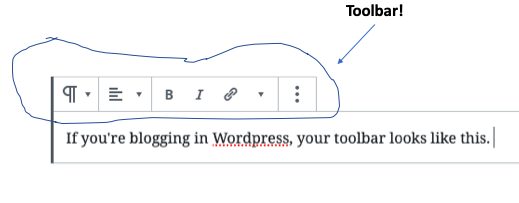
And unlike many things associated with technology that have stupid names, the toolbar’s name actually makes sense. It’s full of things that really are useful. You can use these tools to add numbered or bulleted lists, to add links, or to format your text with bold and underlining and more.
I encourage you to play around with your tools and find out what they can do. Sit down and create a new post, add some text and then see what the different buttons mean. Find out how they work and how you can use them. This will be a post that you delete instead of publish, so it doesn’t even matter if everything goes wonky.
A very useful tool in your toolbar and one that you might not be as familiar with from word processing is the tool that allows you to place links in your blog posts, pointing your reader to interesting places around the internet. And this link tool (see below, Image 2) is the tool we will be focusing on today!

Now first, before you use your tool to add a link to your post, you need the website address you’re going to link to, the URL. The URL for THIS website, for example, is https://myblogschool.ca. You need this information to add the link to your post. And while you CAN go to the link tool in your blog post and type out the entire URL yourself, this can be time consuming and it’s easy to make mistakes. A shortcut is directly copying and pasting the URL from the webpage itself.
Do you see at the top of this webpage where the URL is listed? (Image 3 for an example).
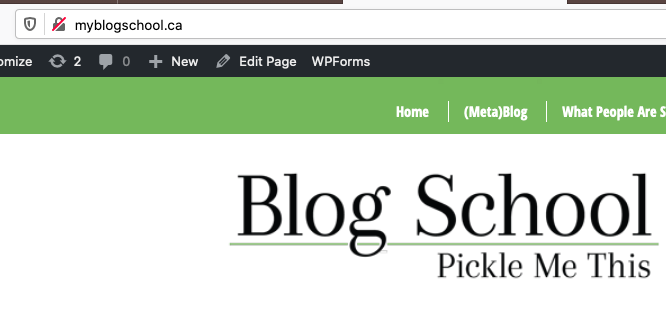
What you do next is use your cursor to select the URL in the window at the top of the page you want to link to. (You can have this page open in a different window than the one you’re composing your post in.) Once the entire URL is selected, you can copy the text to your computer’s clipboard. You can do this two ways: click on EDIT in the menu at the top of your browser and select “COPY.” Or, if you have a MAC, hold COMMAND and press C. And if you have Windows computer, hold CONTROL and press C. Once you have done either of these, the text will be stored on your computer and you’re ready to use the link tool.
And now back to the blog post you are composing. First, use your cursor to highlight the text you want the link to appear in, then click the link tool, which will make a pop-up window appear. (See Image 4)
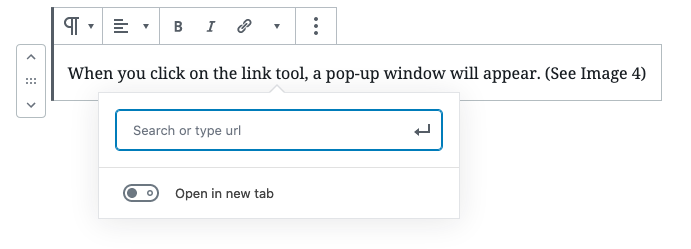
Inside the box that appears, you paste the text you just copied to your computer’s clipboard. You do this by clicking inside the text box and then using the same process you used to copy the text but with paste (either using EDIT in the menu at the top of your browser and clicking PASTE, OR with shortcuts [COMMAND and press V in Mac, or CONTROL and press V in Windows]).
See example Image 5 below.
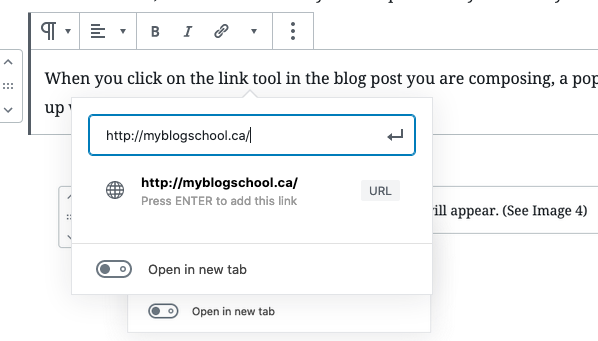
Once the URL is pasted and you’ve pressed ENTER, your link will appear in your post. If you need to remove your link or change the URL you’ve linked to, use the same process with the link tool I’ve outlined here.
Go here for a version of this text that you can print out for future reference.
Happy linking! May you take your readers to good places.
On Being Imperfect in Public
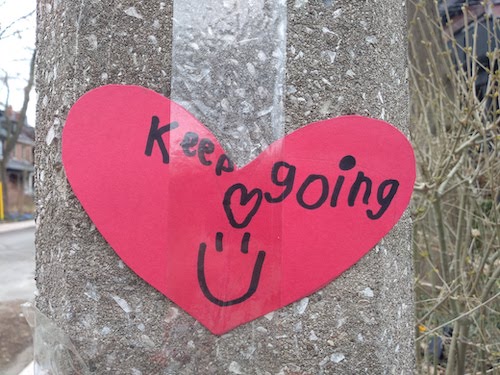
Something I appreciate about being an experienced blogger (20 years in October!) is it also means experience and (relative) comfort with being imperfect in public. I mean, I still don’t like it, the embarrassment of messing up, the humiliation of feeling stupid, but it’s not wholly anathema to my experience. 20 years of blogging has taught me how imperfection is an opportunity for learning and growth, which is the process I hope to never to come to the end of.
And it’s a lesson that it is useful for this cultural moment in which so many many of us who are white have decided to finally show up and take action for racial justice…with the awareness that perfection is just not attainable (though whoever set that standard *really*?) and that we’re all really late to the party.
But to be a blogger is to be somewhat comfortable with discomfort, or at least on familiar terms with it. And that’s useful in so many ways.
- See Rhonda Douglas’s “How Writers Can Beat Perfection”
- See Sharon Bala’s “Imperfection”
- From me, “The Principles of Imperfectionism…”
As you see from these posts, accepting imperfection is essential to finishing anything…and then you get on to the next draft.
With blogging, it’s a little different of course. Like life itself, there is no second draft. You’ll get your chance to fail better in the next post, and the one after that, and over and over again into the future. The point is not to stop.
The Realm of the Possible

It’s been a very hard time. Nearly three months of a devastating pandemic, and now the murderous realities of anti-Black racism laid bare yet again, and I’ve got “A Change is Gonna Come” by Sam Cooke running through my head, but the question is when? (The answer, for all of us, must be: NOW.)
As our June blogging course kicks off this month, however, I am also feeling inspired and excited, because as I read through everybody’s introductions and visions for their blogs, I see so much possibility for a better kind of world, both online and off it. I see approaches blending the personal and professional, writers wanting a space to weave their different passions together, writers desiring to learn to be more comfortable with being uncomfortable and brave enough to share unpolished work with the world. Writers who are in transition, moving toward something new, challenging the blog itself to be capacious enough to hold it all.
And here’s the thing about the blog: it will. If you push it. If you let it.
A blog is inherently a hybrid form—digital with textual and visual elements, and born of pre-digital influences including letters, diaries, even the soapbox. And being a hybrid in form, it’s well-suited to a hybrid of content, even though this might not seem entirely sensible at the outset. “Why AM I blogging about my twin passions for gymnastics and ceramic arts?” one might be asking, and the way to answer this question (and any question about blogging, for that matter) is to write one’s way there.
Because it’s in the blogging itself that the connections between these disparate ideas and others become illuminated, and the project begins to make a certain kind of sense, things that seem unalike becoming linked and the realm of what’s possible expanding.
And this is part of what the world needs right now.
How to Promote Your Novel Online

The most effective way to promote your novel is to assume that nobody cares about your novel, which, more often than not, will turn out to be the case. The death of the author was unfounded, my friends, and indeed, she is alive and well, and expected to visit book clubs and publish first-person narratives delineating her past traumas for the reward of pennies (if she’s lucky) and exposure. Whether this exposure will result in book sales, however, is anyone’s guess.
But still, an author is expected to have a platform, which makes it easier to market her book, for readers to connect—and I’m not being snarky about this. The opportunity to connect with readers is a really important one and can be inspiring to writers as much as readers. And I know there was indeed a time when an author didn’t have to do anything but write her books, and then exit her garret precisely twice a year to be feted as a literary genius, but that was never actually really true, and also that author was a man.
Now when I talk about a platform, I mean a blog, or any of the social media channels that basically function as micro-blogs (which is why everyone who says that blogs don’t matter in 2020 is absolutely wrong), or a combination thereof. And it really helps if the author is not using this platform solely to promote her work, if she finds it natural and enjoyable to engage with these platforms even when she has nothing to sell. There is a direct correlation between what you put into your online platform and what you can expect to get out of it. Also: if you have made a point of blogging and sharing the details of your ordinary life, it just makes sense when that life begins to include the experience of publishing and promoting a book and you don’t even need to feel uncomfortable about it.
But first: you don’t HAVE to do any of this. If blogging and social media micro-blogging make you squeamish, then forget about it. Promoting your novel this way is not going to be effective if you hate it, because people will be able to tell you hate it, and also you’ll stop doing it in a week or two. If you don’t have an online presence at all and you’re looking for a book deal, you’re unlikely to build one significant enough to make a difference in whether or not your book gets signed anyway. I’ve heard conversations about publishers not really caring about anyone’s platform, unless they’ve got at least 100,000 followers, which at first glance is kind of depressing, but then it isn’t, because it just means that the rest of us don’t even have to worry about that anymore.
If you’re not sure about blogging, however, it still makes sense to have a blog on your website, a place to add news and events. If you don’t like the word “blog” (and I don’t blame you), then you can call it something different, and the advantage of having this kind of space on your website is that it helps with your SEO rankings if your site is updated semi-regularly and makes that website a more interesting place.
There are other reasons to blog or micro-blog though, than just for the purposes of promoting your novel—and the great thing about blogging for other reasons is that your blog will thereby be more appealing than one existing for the purposes of self-promotion AND you’ll even end up promoting your novel indirectly.
First, your blog can serve your writing practice. I certainly credit nearly twenty years of blogging with making me a better writer, and also for teaching me the way that small parts can add up to a big project. You can use your blog also as a workbook, a place to challenge your writing chops. There will be a small but devoted audience for that kind of blogging, as there always will be for the kind of interesting blog that exists for its own sake and not to court the attention of others.
Your blog can also serve you as a reader, a place to write about the books you’re reading. Should you include critical reviews? That’s up to you. You can write about new releases, and obscure books, and the kind of reading that informed who you are today as a reader and a writer both, and there will be a small but devoted audience for this kind of blogging too, because you’re giving them something. But the opportunity to engage more deeply with your reading is something that you can get out of the whole thing too, beyond the opportunity to promote your own work. Writing about other writers is also an opportunity to build connections to literary communities—although this is always more easily accomplished when it’s not your explicit purpose.
Another way to use your blog is to write about something that fascinates you, as opposed to something you anticipate potential readers will be into. This means that even if no one is reading, at least you will be having a good time exploring the ideas you’re writing about—and maybe these are ideas connected with your book, extraneous research that didn’t make it into your narrative, trivia surrounding your subject, the stuff you just can’t shut up about. And the perk of all this is that you writing about the stuff you just can’t shut up about is—more than any other kind of calculation—going to result in posts that convey real passion, the kind of thing that people really do want to read.
Remember though that blogs are marginal, peripheral. So are books, for that matter, unless you happen to be John Grisham or Danielle Steele. And so using a blog to promote a book is kind of like using a spaghetti noodle to hit a baseball out of the park. Don’t count on a home-run, I mean. But there are other ways to measure success, your own satisfaction and enjoyment of the exercise among them. All this to say that if you don’t have a ton of readers, it doesn’t mean you’re doing blogging wrong. Really, obscurity is kind of inherent to the form. It means you’re doing it right.
But even in obscurity, you can build up a sizeable collection of “followers,” which I’ve always found a pretty distasteful name for what I’d prefer to call “community.” People who care about you and your ideas, and ideally the feeling is mutual. People who inspire you and make you think, and recommend good books and share links to articles that change your mind, and make it stronger. People who learn from you just as you learn from them, and when your book comes out, they will be the ones (not related to you) who are likely to buy it,
What Should I Blog About?
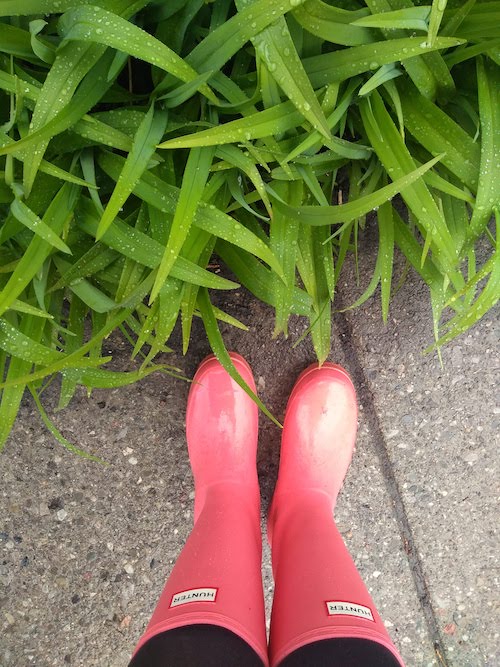
If you’re asking the question, “What should I blog about?” and you don’t have a single answer, then maybe that’s a sign that don’t really need to be blogging. That while the idea of blog sounds like a good thing, perhaps you have some exploring still to do before you get down to the practice of blogging, which is also the practice of noticing things to blog about. Maybe you have to master that first before you get to the next step.
Sometimes though, when somebody asks, “What should I blog about?,” what they’re actually saying is, “Who actually cares about anything I have to say anyway?” And that’s a different kind of question. Your blog is the world through your eyes/your I, and the only person who has that singular perspective is you. What an incredible thing, to be able to see things that nobody else does, to chart a path that’s just your own, and then to share that journey. Even if your journey looks a lot like other journeys—you get up in the morning, you go for walks, you notice what’s blooming in the garden, you take note of the shape of the clouds in the sky. Ordinary, all of it, but it’s yours. Nobody else can tell that story, which is reason enough for you to do so.
“What should I blog about?” can also be a question of what parts of the story to tell though—can you really put the garden, the clouds, the morning light, all of it, into the very same blog? And some people will tell you that you can’t. That what you need is a gardening blog, and a cloud-watching blog, and another blog about the light. But this kind of compartmentalization is not only thoroughly unrealistic, it’s also unsustainable. I can promise you that having more than one blog is likely to lead to abandoned blogs, because it’s work enough to keep a single blog fed and watered, let alone multiples. But also depriving your blog of variety, of space to grow and wander in terms of approach, is also to make your blog less interesting, to reduce the number of people likely to be curious about what you’re putting out there—and to limit your possibilities in terms of what you’re writing about. And why would you do that?
The answer to the question of, “What should I blog about?” will be different for everybody, but it lies along the lines of whatever happens to be in front of you, whatever catches your eye and holds your attention, and makes your wonder enough for that attention to be sustained for a handful of paragraphs. (If you’re genuinely interested in what you’re writing about, than it makes it more likely that somebody else will want to read it…)
It’s also a question that only you can answer.
And if you can’t answer it? (Or at least, if you can’t yet?)
The only solution is to start blogging and write your way.
A Reason to Say YES?
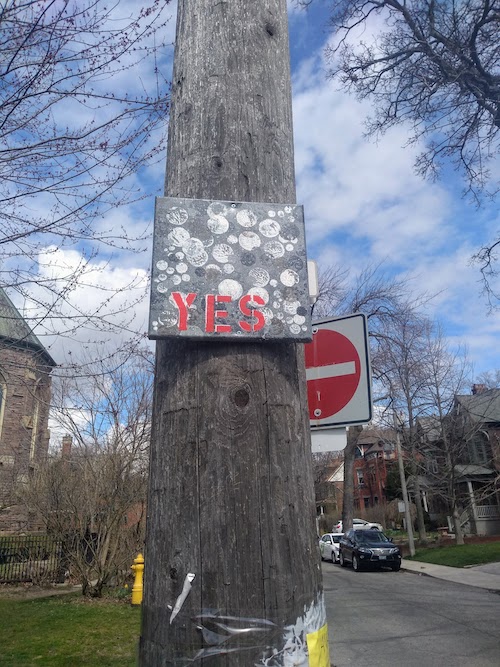
Are you looking for a reason to finally say YES?
Here’s one: just FIVE spaces are left for my online blogging course this June, and they’re filling up fast.
LET’S GET TOGETHER is a fun and casual community-driven blogging experience. If you’ve enjoyed one of my courses already, this new one is right up your street. And if you’re #MyBlogSchool-curious, this is a great and low-cost opportunity to get a taste of what my approach is all about.
And what’s it all about? Program is capped at 15 participants, and each of you will be part of a private online space where you will share and respond to each other’s work. You will create 8 blog posts over the course of the month, inspired by a variety of prompts that you can interpret according to your own blogging vision. I will also be sharing ideas and resources throughout the program, and sending feedback on each of your posts privately by email. Cost is $100 CDN. As ever, our group is coming together amazingly, and it’s going to be so good!
You can reserve your spot today, and while you’re here, why not check out what other Blog Scholars are saying about my courses?
A sample: “I signed up for this course on a whim, after putting off the creation of my blog for months. I thought at the very least, it would force me to buy a domain name and create the website, but I had no idea just how deep it would inspire me to go in my own writing and self-discovery. After just one month my blog is up and running and exactly what I want it to be!”
5 Tips for Blogging Through a Crisis

Even in the strangest days, I insist that blogging still matters and so, to that end, here are my five tips to help you keep going when things are tough.
- Remember that you don’t actually have to—keep blogging through a crisis, I mean. Maybe you’re grappling with the demands of full-time work and childcare, or you’re busy worrying about a loved one on the front lines, or you’re too preoccupied by refreshing news headlines over and over in search of better ones. If you’re heart just isn’t in it right now, don’t beat yourself up. There will be other different seasons ahead—and blogging should never be a chore.
- Let your vision for your blog change. This is good advice no matter what’s going on in the world. A blog needs room to grow and space to wander, and maybe your plans are going to have to be different to accommodate what’s going on in your head these days. That’s okay. It keeps things interesting, and that’s a good thing.
- Don’t be afraid to not have the answers. Also, a bit of evergreen advice, but my goodness, uncertainty sure is having a moment, huh? For the blogger, who is brave enough to write about what she doesn’t know and what she doesn’t understand, however, this is an opportunity because you’ve never had so much material. And if my experience is anything to go on, writing about it is going to make you feel better.
- Take it easy. Life is hard enough right now—don’t be afraid of blogging shortcuts. If you don’t feel like writing, post a photo of a spring scene from your walk each day. Post a few lines from a book you’re reading. A list of your favourite sourdough hacks, or five things that are taking your mind off everything. Whatever strikes your fancy—just keep going!
- Be a booster. What’s the point, you might ask? Who cares what I have to say anyway? I’ve heard that one before… But I would argue that the internet (and the world) needs you more than ever, especially if you’re spreading the word about great stuff that other people are doing these days. Are you blogging about new books, or great local businesses, or homegrown fashion brands, or the best places in town to get takeout? As a blogger, do your part to support the kind of world we want to see on the other side of all this.
This post was first published last week in my Blog School newsletter. Please sign up for it if you’d like to receive similar content monthly direct to your inbox—and you’ll also receive a free download of blogging prompts.
